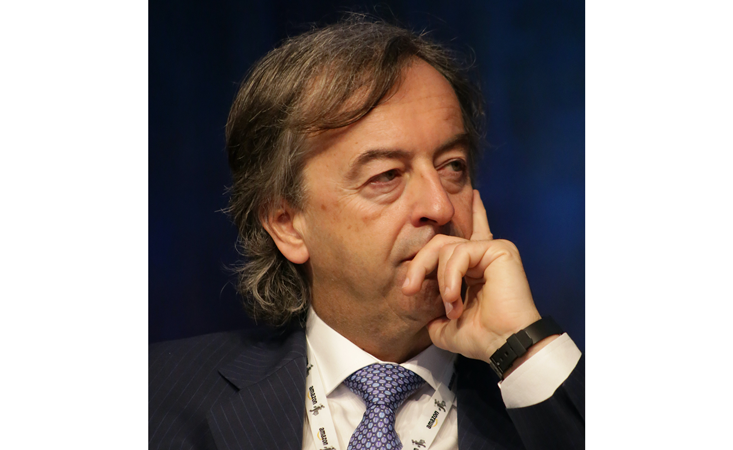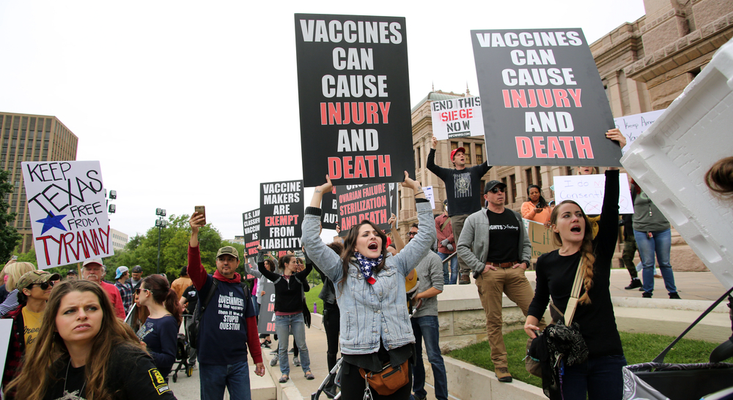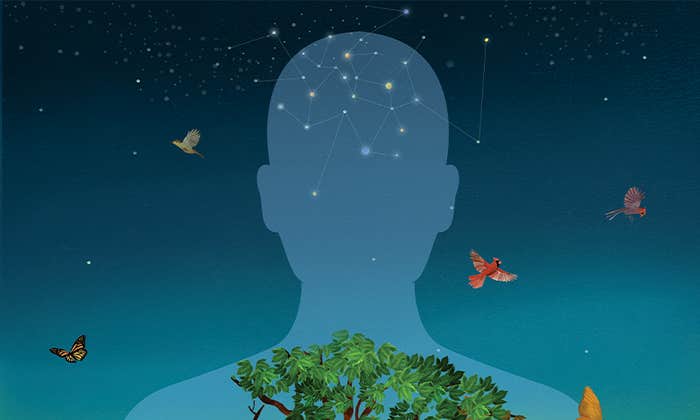Robert Burioni is a virologist at the San Raffaele University in Milan, Italy, and a serious scientist. But in 2016, something happened that changed his course. He was on television with two anti-vaxxers—a famous actress and a former DJ—who were taking on vaccines, reported Science magazine.1 At the last moment, he was given a chance to respond on camera. He said, “The earth is round, gasoline is flammable, and vaccines are safe and effective. All the rest are dangerous lies.” An Italian radio journalist called Burioni’s response “the 13 most beautiful words heard on TV.” An Italian publisher asked Burioni to write a book on vaccines and he complied in four months with Vaccines Are Not an Opinion: Vaccinations Explained to Those Who Really Don’t Want to Understand. Burioni’s experiences with anti-vaxxers have prepared him well for teaching us how to deal with these issues during the COVID-19 pandemic.

Eric Topol: What do you make of the anti-science attitudes we’re facing now?
I believe the problems we are facing with anti-science are gaining a foothold everywhere, and this is very dangerous. This pandemic has taught us clearly that science is the only thing that can save us. So it’s important to trust the science, the pharmaceuticals, and the vaccines.
I always say that drugs are like money; you exchange your goods for pieces of paper, and you do this because you trust that these pieces of paper have a value. With these pieces of paper, you can buy what you want. But it’s only a matter of trust. It’s the same with a vaccine. We can’t really know what’s inside a vial of vaccine. We have to trust doctors; we have to trust authorities; and we have to trust also the pharmaceutical companies, which are not always careful about communication.
When I define someone as an idiot, it’s not an insult. It’s a diagnosis I offer for free.
What’s really worrying, at least here in Italy, is the skepticism that is now growing about some of the vaccines, in spite of very good data. This should prompt everyone, including authorities and pharmaceutical companies, to think about the way they share information about their good work. They have provided very good vaccines, but here in Italy, there is a perception that some of the vaccines are not as good; they are not safe; they are a second choice. This perception is quite harmful.
Abraham Verghese: You’ve said Italy is a country wobbling between science and superstition. I believe that in America it’s very similar, except we’re not wobbling between science and superstition, but between science and suspicion, fueled by social media. You’ve spent a lot of time in the United States. Do you have any thoughts about the differences in the anti-vaccine sentiments in the United States compared with Italy, or is it the same phenomenon?
I can find a huge difference between Italy and the United States, in favor of the United States. One of the problems we are facing in Italy is that lack of a strong institutional voice. A few days ago, a music teacher died after he got the COVID-19 vaccination, which is unfortunate. But in Italy, each year we have around 50,000 cases of sudden cardiac death. So it is not completely strange that one of these deaths could occur in someone after vaccination. But a judge seized the entire lot from which the vaccine had been administered to the music teacher.
The autopsy demonstrated that this man had cardiac problems; the vaccine had nothing to do with his death. We need those vaccines, and they are probably waiting in storage. They will expire and be completely useless. We don’t have a strong institutional voice. We have the Istituto Superiore di Sanità and they are good, but they are not heard. In the modern world, you need to be heard.
The HPV vaccine is an example. Scientific data are absolutely clear that this vaccine is extremely safe and effective in preventing cancer. Everybody is scared about cancer, including myself. So this vaccine is safe and effective, and in Italy, completely free of charge and administered through our national health system. But in spite of all this, more than 50 percent of parents are refusing this vaccination for their children.
I am an immunologist and a virologist. I spend my life working on human monoclonal antibodies and thinking about vaccines. But should I be working to produce a better vaccine when we have a very good vaccine that 50 percent of the people are refusing on the basis of superstition and misinformation?
My father is 92. He’s a retired pediatrician; he stopped working in the year 2000. In his entire life, he never had a single patient refuse a vaccine. Many people are refusing vaccines now and the bad news is that their choices are not made on the basis of rational reasoning, so it’s very difficult to convince them otherwise. It’s almost impossible. They are not so many in number, but they scare other people. I’m a reasonable person, but if I am in a movie theater and somebody screams, “There’s a bomb!”, I’ll run away. I’ll take my daughter away from the danger. Scaring people is very easy.
The problem is that our government sometimes wobbles between science and superstition. They have improved, but they are not perfect. A few days ago, in Piemonte, one of the most important Italian regions, they approved the use of hydroxychloroquine for the treatment of COVID-19, which is unbelievable at this point.
Topol: Up until you were in your 50s, you were, as you say, a hardcore academician. You were a virologist, an immunologist, a pioneer of monoclonal antibodies. Then you added another dimension to the arc of your career, long before the pandemic, to take on the anti-science movement and then the anti-vaccine movement. Now you are engrossed in this. Do you encourage others to do this? Is the net effect something you would advocate or do you have regrets?
I felt this was a duty. When you are a tenured professor, you’re granted a lot of privilege because you’re relatively safe in your job. But this also brings responsibilities. You have a responsibility to your patients as a doctor, professor, and citizen to talk about what can be a dangerous threat for your country. My daughter is 9 years old. In 2015, when she was 4, I realized that at the school she was going to attend, parents were refusing vaccinations.
You can’t convince the really hardcore anti-vaxxer, but you can ridicule them. You can show other people how stupid they are.
This was quite dangerous. In some parts of Italy, vaccine coverage was very low, not only for measles, mumps, and rubella but also for polio—not even reaching 80 percent in some areas, which is unbelievable. This was a real danger. Misinformation was being spread, not by Italians, but by people on social media who could barely speak or write Italian. So I thought, well, I can speak and write Italian and I am more educated than they are. I wondered, why are they so vocal and we are all quiet? So I started to post on Facebook some very simple messages.
I soon realized that the language I needed to use on social media was very different from the language I use with colleagues, students, or patients. All of these people already know and trust me. But social media users don’t necessarily trust you. You have to be convincing and use different language. If we are in a group of scientists and you ask me whether autism is caused by vaccination, I would reply that currently we have no proof that vaccines cause autism, which is correct. But if you say this to an uneducated audience, they will say that vaccines cause autism and the scientists don’t know it because they don’t have enough proof. So we have to be very careful about what we say.
In this case, the form is the substance. Over the years we’ve seen changes in modes of communication: first the printing press, then the radio, and then television. Now we have social media, which is important in the formation of public opinion. When we discuss infectious disease, public opinion is important because if people don’t change their behavior, if they don’t get their vaccines, they’re going to lose against an infectious disease.
Verghese: I’m struck by the title of your second book. You called it The Conspiracy of Dunces: Why Science Cannot Be Democratic. You have a wonderful way with words and you don’t pull your punches. You said, “When I define someone as an idiot, it’s not an insult. It’s a diagnosis I offer for free.” But there is a danger that at times you can actually push people back into their camps and they can become more resistant than ever. Has your strategy evolved over time? Have you learned some lessons on the way?
I remain a scientist, so I am guided by numbers. I don’t have numbers telling me that my communication approach works. I can see the correlation, but I would never say that it is causation. I used the word “dunces” because in Italian it is “donkey”; we say somebody is “a dancing mule.”
Science says that we need a particular dose of amoxicillin. So in regard to convincing people on social media—and this is my personal opinion—I believe that a small percentage of people will never be convinced. They are completely irrational. And because in science we only have rational arguments, it’s impossible to convince them. These people are not numerous; in our most recent elections, they gained about 0.7 to 0.8 percent of votes. But in the places where they are particularly active, vaccination rates have dropped 20 percent — not less than 1 percent as we might expect — because they frighten other people.
Science is not democratic. You can’t decide on the dosage of an antibiotic by a poll or an election.
You can’t convince the really hardcore anti-vaxxer, but you can ridicule them. You can show other people how stupid and ignorant they are and how fake their statements are. You have to demonstrate the disconnect. Being blunt with these people will not affect them. The downside of this is that it exposes you publicly. I’ve received threats and my daughter has received threats. I have police in front of the school my daughter attends. I had to lay low for a period, which was quite unpleasant. When you think about being famous, this is something you don’t take into account. If you want to be a professor or a doctor, you just think about being famous with your colleagues for what you’re doing, to be known in your own circle. But now I’m known by everyone. It is a bit uncomfortable.
One thing that happened was surprising in a good way. I participate in a popular talk show on Sunday nights on Italian state television. I always give a brief, six-minute lecture, and it’s difficult to say all you want to say in such a short time. One evening, I explained what’s in the mRNA vaccine, what is a variant, and how COVID is diagnosed. What was incredible was that the audience numbers peaked when I talked about science. This surprised me, because I had the idea that science is considered boring by the general public. But if you’re presenting it in a way they can understand, people like science.
Topol: Italy and the United States were among the worst hit by the COVID-19 pandemic. And now the numbers are going up again in Italy, and they are beginning to do that in the United States as well, perhaps because of the B.1.1.7 variant. What are your views about that and about the vaccination issue in Europe, in general, and in Italy specifically?
Unfortunately, we are facing a difficult moment. In my hospital last week, 70 percent of the isolates were the English variant, B.1.1.7. This is a dangerous moment. In the United States, you’re vaccinating like there is no tomorrow, and here we are vaccinating at a slower pace because Europe is more bureaucratic.
One afternoon, I volunteered at the vaccination center of my university. I wanted to provide a good example for other academics. And I can tell you that it took me one minute to vaccinate each person but 15 minutes for the paperwork. In 1973 we had a cholera outbreak in Naples, and in one week they vaccinated more than 1 million people. It was another world. We should do the same now.
One problem is that Europe has not been as effective as the United States, the United Kingdom, and other countries in securing the amount of vaccine that is necessary. We are behind in vaccinations, so we struggle with lockdowns and closures.
I believe that the route to saying goodbye to this nightmare we’ve had for the past year is to vaccinate. It’s a miracle that we already have effective, safe vaccines. Absolutely unbelievable; in a year, we actually have more than one vaccine. We should be giving them at a faster pace. Now the government, which was not extremely effective in managing the situation, has changed. They put a very qualified person in charge of vaccination—a general in the army and a well-respected person.
Verghese: We have people here in America arguing that in some cities, for example, Los Angeles, we have already achieved herd immunity. Is there any sense that after such a devastating first and second wave in Italy that you have some degree of herd immunity?
Unfortunately, the numbers are telling us that even in the places where we were hit in the worst way, only 7 to 15 percent of the population was infected, which is far from what’s needed to have herd immunity, assuming that the natural infection is providing immunity, which is not always true. In my practice, I’ve seen many reinfections that are clinically relevant. I’m also seeing infection in vaccinated people, but in my personal experience, these are not clinically relevant infections. I see also from the huge paper that was published in The New England Journal of Medicine,2 describing the situation in Israel, 35 days after the vaccination there are mostly asymptomatic or almost asymptomatic cases. Now, I believe it would be important to know if these people are contagious, because if these people with very mild disease are not contagious, I would call them healthy people with a positive PCR test.

Topol: I had the privilege of working with you on an essay3 about the COVID-19 variants and how to assess them. Thousands of variants have been noted over the course of the pandemic. Only a few of them have surfaced to a potentially worrisome level. You pointed out that we don’t have standardized assays, that we have all sorts of claims—what I’ve called “scariants” — because they just scare people even though they aren’t functional. Some of them are functional, such as the English B.1.1.7 variant, the South Africa B.1.351 variant, and the Brazil P1 variant. But there are so many others and even those have not been fully assessed. Can you comment about the need for a standardized assessment and whether the vaccines work against these variants?
Unfortunately, there is no way to know whether a vaccine works against a variant other than clinical observation. It’s very difficult to establish a protection correlate. But it’s clear beyond any doubt that the immunity elicited by these mRNA vaccines is incredibly strong. Two things about the mRNA vaccines are unbelievably positive from the point of view of a vaccine specialist. First, the immunity is stronger when compared with that of the natural infection. And second, and even more important, is how well they work in elderly people. The flu vaccine does not work very well if you are over 60 or 70 years old, and these are the people who need the protection most. We have these wonderful tools, we have many vaccines, and we have to use them all. In the future, when vaccine supply is not an issue, we will choose the best one.
In Latin we say ex malo bonum: from something bad comes good. I believe mRNA vaccine technology will be extremely important in the future for other infectious diseases and for other diseases in general. This exposure we have now will be beneficial in the future.
This is an incredibly contagious disease, and it’s even more contagious now with the English variant. So that’s the difficulty of the fight, and that’s why it’s so important to vaccinate quickly and to vaccinate as many as we can. That’s the only way I can see for getting out of this situation.
Verghese: Looking into your crystal ball, what is the next year going to look like in Italy, the United States, and globally?
It’s very difficult to make predictions in general when you talk about something that appeared in the world just one year ago. In this case, it’s even more difficult because the virus that appeared one year ago is changing. Today we have a virus that is different from the virus we had six months ago. We also see some differences in COVID symptoms. Viruses change, which is expected. The measles virus that appeared in the 11th century probably also developed many variants in the beginning, and then one variant, the best one, took over, and now we see only that variant.
Science is not democratic. You can’t decide on the dosage of an antibiotic by a poll or an election.
Personally, I believe it will depend very much on vaccinations and whether we will be able to vaccinate the majority of people. At that point, we will need to see what happens to vaccinated people. There are two possibilities: The first is that some variant will cause a clinically relevant disease. This is not certain; we’ll have to see. I personally think it is unlikely because it’s not easy for a virus to escape such strong immunity. We don’t see any signs at the moment, but viruses can be unpredictable, so we have to be cautious.
Then we have to see what the current variants lead to in the vaccinated patients. If the majority of them will be almost asymptomatic, and if transmission is reduced, it’s likely that we will live in a world where, once everyone is vaccinated, this would be the fifth coronavirus causing a nondangerous respiratory disease. We’ll have COVID in a very mild form, children will get this very contagious virus as they get other respiratory viruses, and they will develop immunity or they will be vaccinated against it. I hope that this will become a mild respiratory disease, as it already appears to be in vaccinated people.
Topol: Many different vaccines have now gone through large trials. The mRNA vaccines have efficacy for symptomatic infection reduction of around 95 percent while others are around 70 percent efficacy. Should people have respect for these efficacy numbers or does it not matter?
We should have a huge respect for these numbers because up to now, what was seen in the clinical trials has been replicated in real life. In Israel, more than 1 million people participated in that real-world study4 and the numbers were the same.
Right now, two numbers are the most important. The first is the efficacy against severe COVID-19 infection. That’s important because mild infection is not a problem. It’s a discomfort, but I wouldn’t say it is a medical problem. Severe infection is a medical problem, not only for the patient but also for the health system. So these are very important numbers.
The other important issue, which is more complicated, is the vaccine’s effect on transmission. We need to know if any given vaccine is able to stop transmission, because if a vaccine is preventing the disease but is not preventing the transmission, then it only protects the single person who is vaccinated. If another vaccine prevents the disease and also stops the transmission, with that one, we can protect the community.
From my experience as a virologist, I’ve never heard of a vaccine having a 95 percent effect on preventing disease that doesn’t have a profound effect on transmission. Not a single one that hasn’t been a huge obstacle to transmission. The latest data from Israel are showing that the Rt [rate of transmission] went down to 0.5, even in the presence of this terrible variant, which is almost too good to be true because this means that transmission is affected. Without a relevant animal reservoir, and if transmission is affected by the vaccination, we can get rid of this virus. That is the end of the story.
Eric J. Topol, MD, is one of the top 10 most cited researchers in medicine and frequently writes about technology in healthcare, including in his latest book, Deep Medicine: How Artificial Intelligence Can Make Healthcare Human Again.
Abraham Verghese, MD, is a critically acclaimed best-selling author and a physician with an international reputation for his focus on healing in an era when technology often overwhelms the human side of medicine.
This interview originally appeared on Medscape. Follow Medscape on Facebook, Twitter, Instagram, and YouTube.
References
1. Starr, D. This Italian scientist has become a celebrity by fighting vaccine skeptics. Science (2020).
2. Dagan, N., et al. BNT162b2 mRNA Covid-19 vaccine in a nationwide mass vaccination setting. The New England Journal of Medicine (2021). Retrieved from DOI: 10.1056/NEJmoa2101765
3. Burioni, A. & Topol, E.J. Assessing the human immune response to SARS-CoV-2 variants. Nature Medicine (2021). Retrieved from DOI: 10.1038/s41591-021-01290-0
4. Pfizer. Real-world evidence confirms high effectiveness of Pfizer-Biontech COVID-19 vaccine and profound public health impact of vaccination one year after pandemic declared. Pfizer.com (2021).
Lead image: khaleddesigner / Shutterstock


























